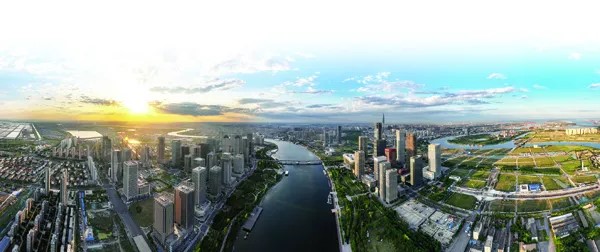TEDA: Pioneering development in China's economic landscape
(exploringtianjin.com)| Updated : 2024-11-26
Print PrintTEDA has taken the lead in China in its reform and opening-up, its new productive forces as well as luring foreign-invested capitals.
Situated at the crossroads of the Bohai Economic Rim area and the Beijing-Tianjin-Hebei metropolitan region, the Tianjin Economic-Technological Development Area (TEDA) spans a planned area of 403 square kilometers.
Over the last four decades, TEDA has been transformed from a barren salt marsh into a leading international industrial hub, serving as China's first free trade pilot zone in the North China region and one of China's first-batch national-level development zones, excelling in economic scale, openness and investment environment.

A legacy of transformation
TEDA hosts major players such as FAW Toyota, FAW-Volkswagen, Great Wall Motors, Otis Worldwide Corp China, SEW, Samsung Electro-Mechanics, PPG and Novo Nordisk, making it a powerhouse for industrial innovation and collaboration.
Foreign-invested enterprises in TEDA contribute approximately 45 percent of its tax revenue, nearly half of its GDP, and over 70 percent of its industrial output value.
Since 2016, TEDA-based enterprises have launched 184 outbound investment projects worth $4.45 billion and the projects are located in countries and regions of Europe, North America, South America, the Oceania, Africa and Asia, strengthening China's global economic footprint.
Driving innovation and global outreach
The development zone offers policies that include 100-day "land-to-operation" approvals, offshore trade facilitation, and targeted support for emerging industries such as OTC-targeted cultivation services and independent evaluation services for skilled talents.
It has also advanced cross-province services under the Beijing-Tianjin-Hebei cooperation framework, standardizing 203 services and enabling seamless cross-region administrative collaboration.
Championing sustainability
TEDA is at the forefront of sustainable development, housing 30 national-level green factories and 12 green supply chain enterprises. It has also been awarded numerous prestigious green accolades, including the ISO14000 China Demonstration Zone, the National Circulating Transformation Pilot Park, and first APEC Low-Carbon Model Town. This focus on green manufacturing demonstrates its success in integrating industrial growth with environmental responsibility.
A model for reform
TEDA has been taking the lead in reforms, including pioneering the nationwide paid-transfer of 70-year land-use rights and establishing specialized economic courts like the TEDA Financial Court and the Binhai International Commercial Court.
Unique in its origins, TEDA was established with an initial development loan of 370 million yuan ($51 million), without government fiscal funding. Its success is a testament to the power of innovative governance and reform, setting benchmarks for China's modernization and economic transformation.